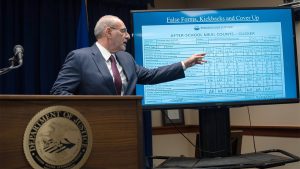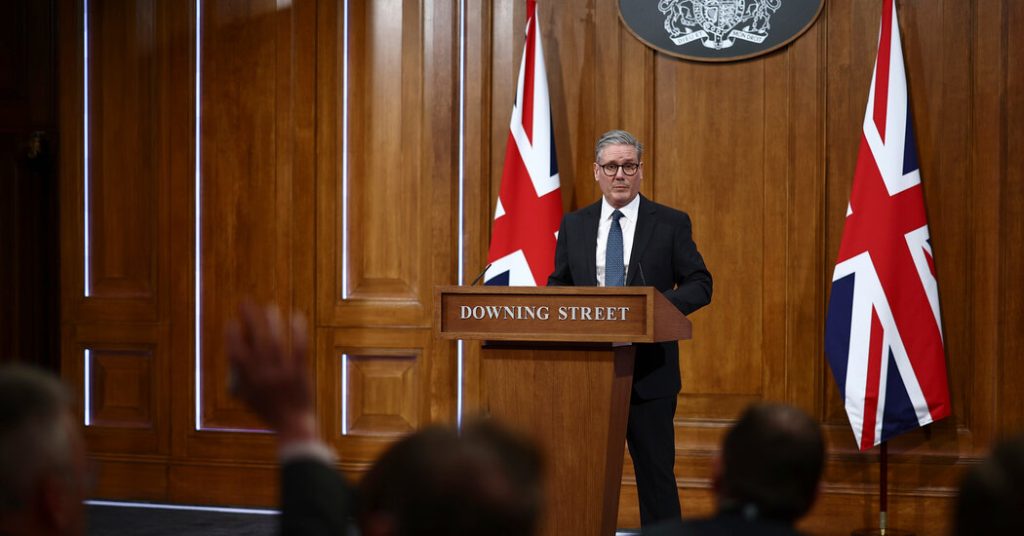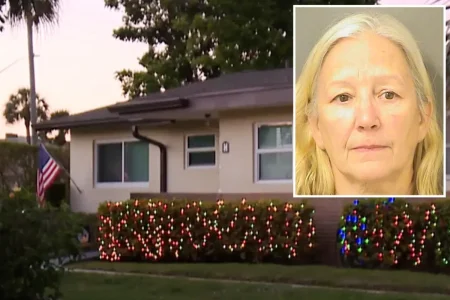In the wake of an unsettling tragedy in Southport, England, British Prime Minister Keir Starmer addressed the nation with a chilling warning: a new form of extremism is emerging, one that is dangerously unpredictable and rooted not in clear ideological frameworks, but in an almost nihilistic obsession with violence. This new threat, characterized by loners and isolated individuals radicalized online, is forcing Britain to rethink what terrorism looks like in the digital age and how to respond to it.
—
### A Tragedy Unfolds
The catalyst for this somber reckoning was the brutal murder of three teenage girls in Southport by an 18-year-old named Axel Rudakubana. On the night of July 29, 2022, Rudakubana stormed a dance class, unleashing chaos and attempting to kill 10 other people in addition to his victims. This horrifying act left the nation grieving and sparked riots across England and Northern Ireland fueled by misinformation and anger. Rudakubana’s senseless violence painted an unsettling picture of modern extremism—one as decentralized as it was devastating.
Following his arrest, investigators uncovered a trove of disturbing materials Rudakubana had accumulated: documents, videos, and texts depicting violence, conflict, and genocide. Serena Kennedy, the chief constable of Merseyside Police, revealed that Rudakubana harbored “an unhealthy obsession with extreme violence.” Yet, despite these red flags, no singular ideological thread could be identified in his motives, setting this case apart from traditional terrorism. Kennedy affirmed, “From all those documents, no one ideology was uncovered,” explaining why the case had not been officially treated as terrorism.
—
### The Failures of Prevention
The revelations around Rudakubana’s actions and his history brought sharp criticism of Britain’s current frameworks for identifying and intervening in extremist behavior. It emerged that Rudakubana had been flagged three separate times to Britain’s Prevent program—a governmental initiative designed to counter radicalization. He was referred at the ages of 13 and 14 due to his apparent fascination with violent content, but since no discernible terrorist ideology underpinned his behavior, he was deemed unsuitable for intervention.
Prime Minister Starmer didn’t mince words when addressing this grievous oversight. He described the failure to act as “clearly wrong” and refused to allow any state institution to evade responsibility for what he called a flagrant lapse in judgment. “In this case, frankly, it leaps off the page,” he said. Starmer emphasized that evolving forms of radicalization, like Rudakubana’s fixation on violence, must be taken just as seriously as terrorism motivated by ideology. Otherwise, the very system put in place to protect society risks leaving gaping blind spots.
—
### The Digital Tidal Wave
Central to this new wave of extremism is the internet, which Starmer described as inundating vulnerable and disillusioned individuals with a “tidal wave of violence.” Unlike the structured radicalization orchestrated by groups like Al Qaeda, which relies on a discernible ideological narrative, this emerging threat is amorphous. It thrives in the shadows of online platforms, preying on loners and misfits who spend hours immersed in violent content. The Prime Minister noted striking parallels between Rudakubana’s actions and America’s rash of school shootings, where perpetrators often share an eerie fixation on violence for its own sake.
The problem, Starmer explained, isn’t confined to Rudakubana’s case or even the United Kingdom. “We also see acts of extreme violence perpetrated by loners, misfits, young men in their bedroom,” he said. “Desperate for notoriety… fixated on that extreme violence, seemingly for its own sake.” While traditional terror groups may sometimes inspire such individuals, their motivations appear to go beyond ideology into a raw, destructive nihilism. This blurring of lines between ideology-driven terror and individual violent extremism adds complexity for law enforcement and policymakers tasked with preventing such acts.
—
### Misinformation and the Aftermath
As if Rudakubana’s heinous crime weren’t horrifying enough, the aftermath of the Southport attacks revealed how misinformation can further exacerbate societal tensions. In the days following the tragedy, false claims spread like wildfire, suggesting that the killer was a recently arrived Syrian refugee. This inflamed existing xenophobic sentiments and fueled riots across multiple cities. The truth—that Rudakubana was born in Wales—did little to quell the damage caused by these baseless accusations.
Right-wing critics accused the government of suppressing information about the perpetrator’s identity to stave off public outrage. However, Starmer firmly refuted these claims, emphasizing that British law prohibits disclosing investigative details during ongoing court proceedings. “If this trial had collapsed because I or anyone else had revealed crucial details… the vile individual who committed these crimes would have walked away a free man,” he explained, defending the importance of protecting the judicial process over appeasing public demand for transparency.
—
### A Crossroads Moment for Britain
In light of this tragedy, Starmer called the Southport killings “a line in the sand for Britain.” He acknowledged the need to hold institutions accountable, reform policies, and critically examine the current approach to counterterrorism and extremism. The Prime Minister proposed significant legal reforms to address this new type of threat, arguing that Britain’s antiquated antiterrorism laws might need to evolve to tackle the unprecedented challenges posed by digital radicalization.
“This is not an isolated, ghastly example,” he said, referring to the Southport attack. “It is, in my view, an example of a different kind of threat.” Starmer’s call to action is driven by justice and the need to prevent future tragedies. In his view, the lessons from Southport must shape a more robust response to modern extremism—one that doesn’t shy away from difficult questions or uncomfortable truths.
—
### Opposition Calls for Transparency
While Starmer’s speech laid out a compelling roadmap for change, the opposition wasn’t ready to let the government off the hook entirely. Chris Philp, the home affairs spokesperson for the Conservative Party, welcomed the announcement of a public inquiry but insisted it must probe deeper into the timing and transparency of government actions. He demanded clarity about “what the government knew when,” whether authorities had been sufficiently open with the public, and how a potential lack of transparency might have contributed to the riots.
—
### Moving Forward
The tragedy in Southport serves as a grim reminder that extremism is evolving in ways that challenge traditional understandings of terrorism. The shift away from organized, ideology-driven threats to decentralized individual radicalization presents a massive challenge for governments and societies worldwide. Rudakubana’s case exposes significant cracks in Britain’s current preventative measures, showing that “unexplained” violence can no longer be treated with less urgency than ideologically driven attacks.
Prime Minister Starmer has vowed to ensure that the Southport killings prompt substantial change, not only in terms of policy and accountability but also in how Britain adapts to the realities of extremism in the digital age. By confronting the insidious pathways of online radicalization, acknowledging institutional failures, and championing reforms, Britain may be able to better safeguard its citizens without compromising justice.
For now, Southport stands as a somber milestone—a wake-up call to a society grappling with a form of violence that is as scattered as it is sinister. But whether this tragedy will truly mark the beginning of meaningful change remains to be seen. What is certain, however, is that the stakes could not be higher.











